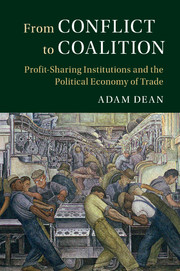Book contents
- Frontmatter
- Dedication
- Contents
- List of Figures
- List of Tables
- Acknowledgments
- 1 Introduction
- 2 A Theory of Profit-Sharing Institutions
- 3 Evidence and Research Design
- 4 The Gilded Wage: Trade Politics in the American Textile and Steel Industries
- 5 Liberalized by Labor
- 6 Trade Politics in Britain and Argentina
- 7 Power Over Profits
- 8 Conclusion
- References
- Index
- Miscellaneous Endmatter
2 - A Theory of Profit-Sharing Institutions
Published online by Cambridge University Press: 05 September 2016
- Frontmatter
- Dedication
- Contents
- List of Figures
- List of Tables
- Acknowledgments
- 1 Introduction
- 2 A Theory of Profit-Sharing Institutions
- 3 Evidence and Research Design
- 4 The Gilded Wage: Trade Politics in the American Textile and Steel Industries
- 5 Liberalized by Labor
- 6 Trade Politics in Britain and Argentina
- 7 Power Over Profits
- 8 Conclusion
- References
- Index
- Miscellaneous Endmatter
Summary
Sometimes workers join their employers in support of the same international trade policy. At other times, workers disagree with their employers and challenge the trade policy reforms that would benefit their own industry. What explains this variation in workers’ trade policy preferences? When will labor share the same trade policy preference as capital? In order to solve this puzzle, I argue that we can understand workers’ trade policy preferences by analyzing how the effects of international trade are filtered through domestic labor markets. Trade policy directly increases profits, but whether or not these increased profits lead to an increase in wages depends on the outcome of wage bargaining between capital and labor. Surprisingly, the extant IPE literature tends to ignore this entire realm of political economy, overlooking how labor market institutions influence who wins and who loses from economic policy reform. This chapter opens the black box of domestic labor markets and explains the conditions under which workers expect an increase in profits to lead to an increase in wages. I predict that it is then, and only then that workers will join their employers in support of trade policies that benefit their industry.
This chapter presents my theory of profit-sharing institutions in three steps. First, it explains why workers’ wages do not automatically increase along with trade policies that benefit their industry. As part of this analysis, I unpack the causal logic of the neoclassical models that dominate research on the political economy of international trade. This exercise demonstrates that once we relax the models’ assumption of full employment, capital captures all of the benefits of favorable trade policy reform. In this scenario, workers do not expect to receive a share of their industry's increased profits and therefore have no economic incentive to support the international trade policy favored by their employers. Or, as a prominent nineteenth-century American labor union newspaper explained, “unless the workmen were paid their share of protective tariff they could not be expected to support the party of protective tariff.”
Second, it introduces the possibility of workers developing bargaining power and negotiating with their employers for a share of increased profits. Broadly speaking, workers develop bargaining power by establishing the ability to launch costly strikes that stop production.
- Type
- Chapter
- Information
- From Conflict to CoalitionProfit-Sharing Institutions and the Political Economy of Trade, pp. 13 - 36Publisher: Cambridge University PressPrint publication year: 2016

